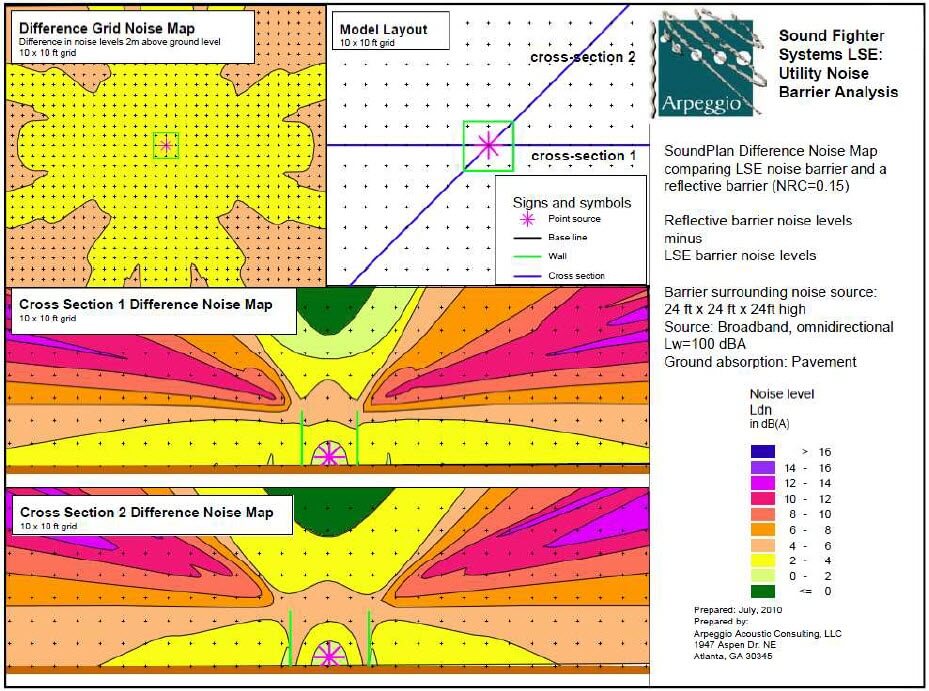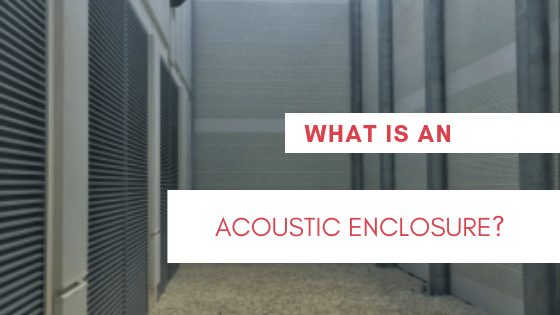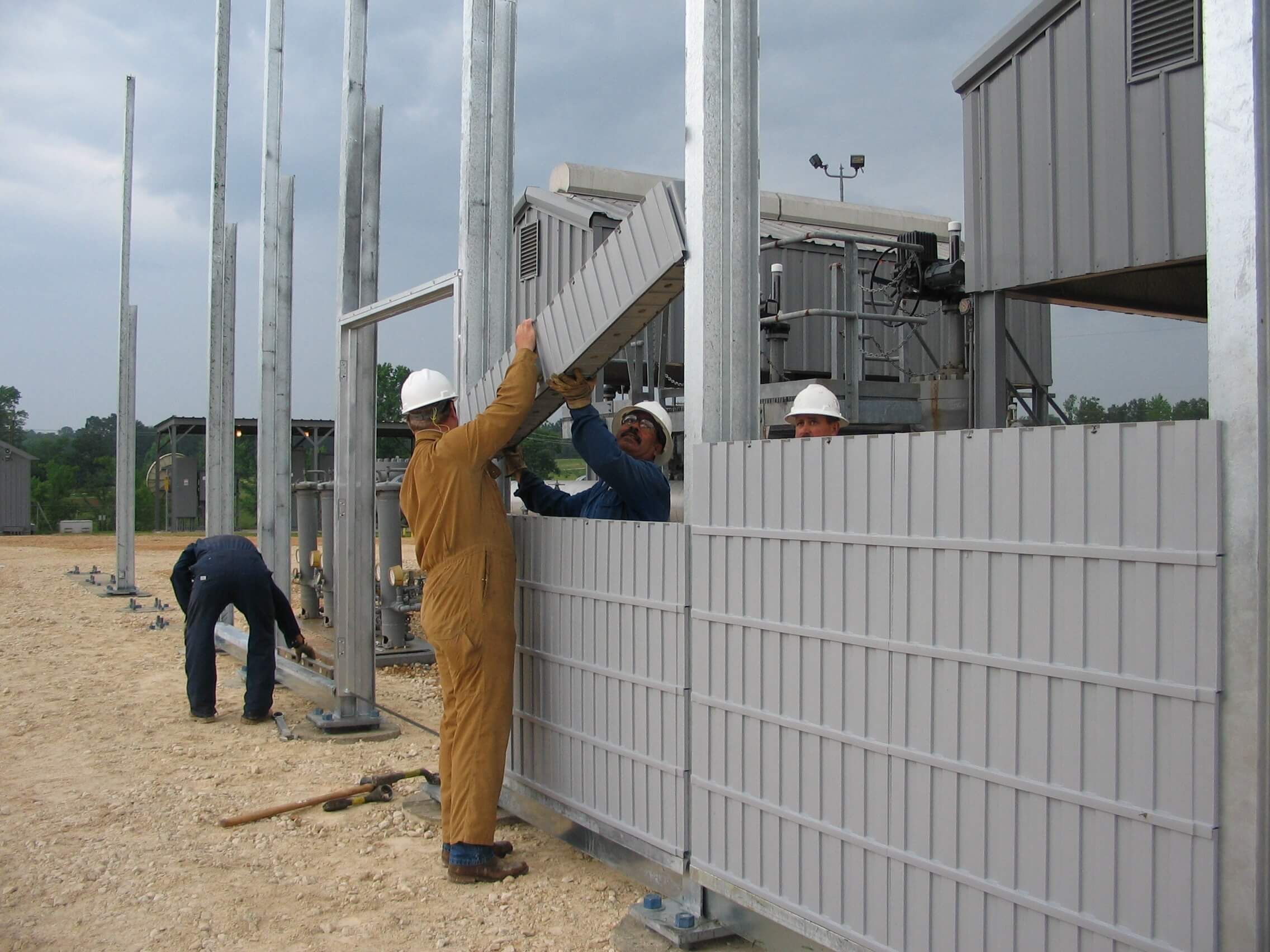Unless you live far from high traffic and big city life, the thought of sound barrier walls may not cross your mind. Outdoor acoustic panels provide a variety of benefits for workers, residents, travelers, and local wildlife.
Whether sound levels above 85 decibels come from a busy roadway, commercial HVAC equipment, electrical transformer noise, generators, or busy warehouses, such sound levels can be dangerous to human health and wellness.
Many municipalities and government bodies across the globe enact regulations and ordinances limiting the level of noise in their communities.
What Does An Acoustical Enclosure Do?
These structures reduce noise by offering outdoor soundproofing. Acoustic panels or enclosures get rid of offensive noise by dampening it. Sound waves above 85 decibels are harmful to individuals living near highways and can lead to headaches, increased allergy symptoms, insomnia, and other health concerns.
Acoustic enclosures reduce these problems and help local governments adhere to strict federal noise ordinances.
Generally, any enclosure that is classified as “acoustic” is designed specifically to reduce, minimize or eliminate sound emanating from a specific source or sources.
The most common type of outdoor acoustic panels include a series of noise canceling or reducing panels useful for helping commercial and industrial companies maintain compliance with local and national noise ordinances.
These panels create quieter environments where individuals can work safely away from equipment noise or to enclose equipment to protect nearby workers from loud sounds.
For indoor applications, acoustic rooms may provide quiet spaces for people to meet or operate businesses without traffic noise, HVAC noise, or utility equipment interfering.

Decibel Levels of Typical Construction Equipment
- Logging equipment like chainsaws – 110 decibels
- Hammer drills – 115 decibels
- Construction tools like jackhammers – 100 decibels
- Chop saws – 105 decibels
- Industrial acoustic panels reduce vibration effects
What is an Acoustic Engineer?
An acoustic consultant or engineer is the person who investigates and solves problems with noise. This person must go to college and get a graduate degree in a particular engineering field.
These experts may study electrical, mechanical, civil, audio, human factors, or other engineering fields.
They work in various jobs as an environmental sciences engineer, audio sound specialist, building designer, underwater sound management specialist, or highway design engineer.
They collect, conduct tests, and study data, head projects to mitigate sound, give lectures on various engineering topics, or work with business owners to develop a feasible construction plan to create project blueprints.
Acoustic engineers use the data they collect to develop effective strategies to reduce noise levels. They help businesses protect workers from commercial equipment noise, and they help residents who live near loud generator stations and freeways.
Reducing noise levels improves the quality of life for animals, local residents and improves employee health.
Staying Compliant with Noise Regulations
By using an acoustic enclosure for compressor noise, businesses protect workers from the unnecessary effects of constant exposure to loud noise sources.
Living in an apartment building next to a popular movie theater might be a huge problem if it were not for sound walls.
These soundproofing panels help reduce the noise that gets out of the movie theater lot affecting nearby residents and businesses.
Difference Between Acoustic Reflectors and Sound Absorbing Materials
The acoustic reflector material in these cases bounces sound in the opposite direction. With traditional sound walls, the government and civil engineers would use cement and brick to create a wall between the offensive machinery and residential or work areas.
Conversely, a sound-absorbing fiberglass wall panels reduces the level of noise by dampening the sound and making the waves less effective or loud. This technology safely dissipates the energy to kill the sound.
Applications for Industrial Acoustic Enclosures
- Outdoor generator enclosure for reducing the constant frequencies from this equipment
- Warehouse office space for reducing equipment noise to meet office standards of 50 decibels or lower
- Industrial control rooms providing operators a noise safe environment for the duration of the work shift
- Transformer enclosures minimizing equipment hum and high-frequency sounds
- Compressor rooms to limit noise levels getting past the sound enclosure
- Ventilation equipment for large residential areas, commercial complexes, health care facilities, and warehouses
- Quiet zones for any construction project or business sector
How an Acoustic Engineer Helps Commercial Projects
On a larger scale, highways and high-traffic areas need noise barriers to reduce the sound levels in a dense area. Acoustic engineers take the following steps:
- Study the problem
- Address the scope of the project
- Identify mitigating circumstances
- Devise a solution that addresses all the problems and custom features.
Finally, the acoustic consultant creates the models and blueprints to effectively implement the solution. The engineer will work as part of the team to see the job to completion. Any testing and noise monitoring will also be the responsibility of this person.
Reduce Noise Levels for Employees
When people constantly hear noise levels above 85 decibels, they may become irritable and moody. Workers may feel nauseous, have headaches, or feel anxious for seemingly no reason.
People may experience problems hearing equipment, phone conversations, loudspeakers, or horns from forklifts creating other safety hazards. Mitigating sounds inside warehouses and large facilities is key to protecting your workforce.
Don’t Forget Outside Workers
Generators, ventilation fans, and other outdoor equipment are still noisy enough to affect outside workers. These machines can easily exceed the threshold for hearing damage. To protect outside teams like construction workers, engineering consultants, and field agents it is important for companies to install outdoor sound barriers.
Trouble paying attention, slacking off, and mixing things up are other common traits.
A sound enclosure can mitigate noisy machinery and make the workspace quieter and safer.
Reduce Noise Levels for Residents
Several states have noise ordinances in place to protect people living near large roadways and areas where highway traffic is frequent.
Each municipality is welcome to adopt their own solutions to reduce and prevent offensive sounds as long as each adheres to federal restrictions on levels above 85 decibels.
Civil engineers and acoustic consultants work with these local entities to devise custom solutions to provide the most benefits for noise reduction in each community.
Installing A Sound Wall
Most sound walls can go in place with a small crew of four to eight people in about a day. Larger construction projects may take more employees and time, but the walls are quicker to take down and transport to another site when used for temporary construction projects.
Benefits of Using Acoustic Enclosures
Acoustic panels use sound dampening materials that soak up the energy of the sound wave. The walls let noise enter the front surface and once the sound wave exits the opposite side, it has much less energy and impact, reducing the effect on the neighborhood and the local environment.
Many cities use this technology to adhere to federal noise ordinances. Sound Fighter Systems designs customizable sound barrier walls for many industrial and commercial companies.
Our acoustic sound barrier meet or exceed national safety standards. These walls offer the best science has to offer. With fire, rust, and pest-proof technologies, these lightweight walls are also reconfigurable, portable, and quick to assemble.
Our walls reach or exceed noise coefficient reduction levels by reaching a one. Whether you need to encase a large generator, block airport noise, mitigate the sound of large groups during business hours, or protect school children from factory noise, our acoustic walls will fit the need.
Sound absorbing panels instead of reflecting sound away from a group provides a stronger structure and reduces unnecessary sound. Acoustic walls reduce sound energy instead of reflecting it in a different direction.
To learn more about acoustic wall panels and how they help companies and residents, please contact Sound Fighter Systems. Our team is happy to answer your questions or set up a consultation to see how our custom acoustic wall enclosures can help you and your commercial project.
Updated 5/12/2022



That was a very informative article! An acoustic panel is a modular component used to block or absorb noise at various points along the transmission of sound from the source to the receiver. Installing acoustic wall panels assists in controlling sound levels, resulting in a safer workplace for workers and building occupants through improved communication and less background noise. Not only is the technology used to reduce noise from commercial HVAC equipment, but many localities employ it to comply with federal noise restrictions.